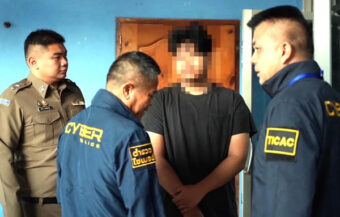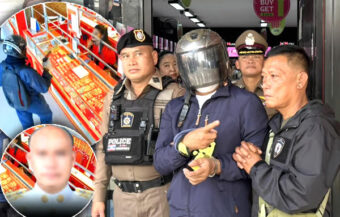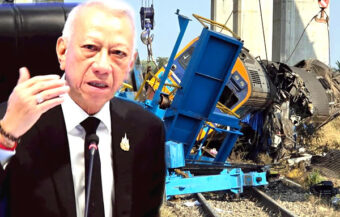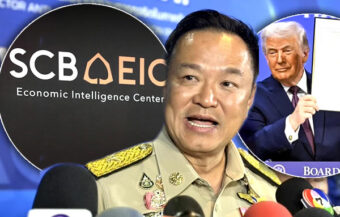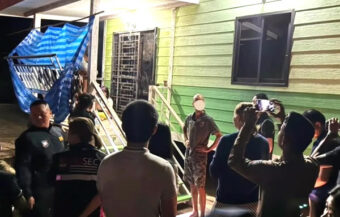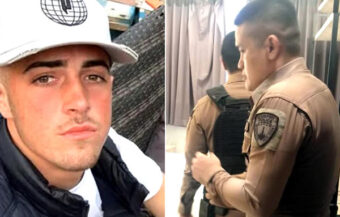UK ambassador warns Thai officials about rising cannabis smuggling cases as 200 people arrested in the UK this year. Thai government moves to tighten cannabis regulations, introducing tougher penalties for unlicensed sales and smuggling crackdown.
Thailand’s top brass within drug enforcement this week heralded a new era in the regulation of cannabis within the kingdom. It followed a high-level meeting on Monday with UK Ambassador to Bangkok, Mark Gooding. The British envoy warned that the number of people smuggling product from Thailand to the United Kingdom has risen sharply. Indeed, 200 people have been arrested on arrival from Thailand so far this year.
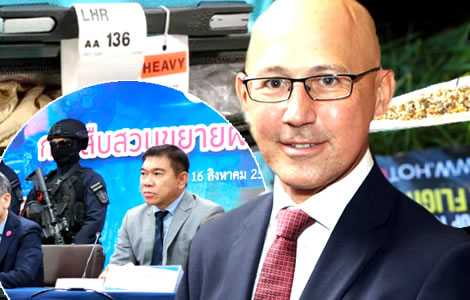
On Monday this week, the UK ambassador to Thailand expressed concern that the current regime for cannabis in the kingdom is becoming a hotbed for criminality. In particular, Mr. Gooding revealed that no less than 200 people have been arrested by UK authorities so far this year, engaged in smuggling contraband into the country.
One of these was a 45-year-old UK man, Nathaniel Benson. At length, Mr. Benson was arrested at Heathrow in September. He was nabbed after flying in with 100 kg of cannabis contained in five suitcases.
Thai officials meet to address cannabis abuse concerns following UK ambassador’s warning over rising cases
The meeting on Monday was attended by the Thai Drugs Suppression Czar, Police Lieutenant General Panurat Lakboon. In addition, officials from the Airports of Thailand (AOT), the Royal Thai Police and the Customs Department took part in the discussions.
Following the meeting, Police Lieutenant General Panurat further confirmed that on Tuesday, the Thai Cabinet approved several significant measures to control the abuse of cannabis for criminal purposes in Thailand.
Police Lieutenant General Panurat briefed the media on Wednesday. In particular, he highlighted new regulations to control the import and export of cannabis in Thailand.
In addition, the Cabinet is to review a legislative bill on the matter.
New legislative bill to reclassify cannabis as a narcotic and restrict sales and use under government licence
For instance, the drug is to be reclassified as a narcotic, only to be shipped into or out of the country with a government licence. Furthermore, the government is to move to restrict and control both the sale and use of the drug in society.
The draft new legislation, drawn up by the Ministry of Public Health, however, does not go as far as re-criminalising the drug as a scheduled narcotic across the board. Neither does it specifically outlaw the recreational use of the drug de jure.
Nonetheless, de facto, that is what is proposed. Certainly, it is being proposed that any use of cannabis beyond medical, research and officially licensed industrial purposes be banned.
The bill must now be scrutinised by the Council of State before it begins the parliamentary process.
In short, the new bill will oblige cannabis dispensaries or outlets to justify their activities on medical grounds. Furthermore, it will outlaw, as before, the widespread sale and use of the drug without an official licence or dispensation.
Cannabis sellers without a licence face severe penalties, with harsher laws championed by top Thai drug officials
Significantly, the matter is being championed at this time by Thailand’s Drugs Suppression Czar, Police Lieutenant General Panurat. In brief, the Office of the Narcotics Control Board (ONCB) will again play its role in controlling the drug in Thailand.
UK holiday maker to Thailand lands in Heathrow Airport London with £1 million worth of cannabis
Under the new law, anyone found buying or selling cannabis commercially without a license will face prosecution. In summary, the offence will carry a five-year jail term and a fine of up to ฿500,000.
At the same time, smaller-time sellers will be subject to prosecution under another offence, carrying a one-year prison term and a fine of up to ฿100,000.
It is also proposed to make using cannabis outside the specified uses in the law an offence. However, those convicted on this basis will not face a prison term. Instead, there will be fines of up to ฿60,000.
Political tensions rise over cannabis law changes as Pheu Thai promises stronger control while Bhumjaithai remains committed to legalisation
Meanwhile, the political context of the new law on cannabis must be noted. The Pheu Thai Party had promised in its campaign that the drug would be controlled.
Before last year’s election, public anxiety over cannabis was a significant issue. On the other hand, the Bhumjaithai Party is committed to maintaining the party’s legacy of legalising the substance.
Before his ouster in August this year, former Prime Minister Srettha Thavisin had backed down on an even tougher effort to control the drug. Basically, that plan, pushed by the current Minister of Public Health, Somsak Thepsutin, would have re-criminalised the substance as a prohibited narcotic.
Nonetheless, it is important to note that even under the current regime, any cannabis extract with THC (tetrahydrocannabinol) over 0.2% is de facto illegal. Undoubtedly, this would apply to nearly all cannabis or related products sold in Thailand today.
Shops importing cannabis from the US under scrutiny as government signals a tougher stance on enforcement
Indeed, many shops are importing weed from the United States with a THC value of up to 25%.
In the meantime, by placing the issue in the hands of the Office of the Narcotics Control Board (ONCB), the Pheu Thai-led government is making its intentions clearer, certainly sending a signal to its voter base.
Notably, there are rising tensions between the Pheu Thai Party and the Bhumjaithai Party, despite insistent statements to the contrary.
Afterwards, the new law must be processed through Parliament. At the present time, it is expected to have majority support in the House of Representatives. Both the Democrat Party and the rump of the Palang Pracharat Party strongly support a tougher stance on the drug.
On Monday, this sentiment was conveyed to the UK ambassador. At length, he was assured that Minister of Justice Thawee Sodsong had ordered the Office of the Narcotics Control Board (ONCB) to work closely with the UK National Crime Agency (NCA).
Furthermore, plans were outlined for Thailand’s airport screening personnel to improve efforts aimed at seeking out and detecting drugs in transit.
Join the Thai News forum, follow Thai Examiner on Facebook here
Receive all our stories as they come out on Telegram here
Follow Thai Examiner here
Further reading:
UK holiday maker to Thailand lands in Heathrow Airport London with £1 million worth of cannabis
Dark web Xanax counterfeiting gang managed from Thailand smashed in the UK with 10 people convicted
Unlikely rags to riches convict star arrested again in Thailand over online gambling promotion
Iconic 70s Bangkok comes to life again as the dark story of The Serpent wows world Netflix audiences
Calls for murdered Norwegian woman’s Japanese killer to be brought to justice if found in Thailand
Thai prison nightmare helped American copywriter Jesse Moskel put his life on a firm path
Filming of Fast and Furious movie begins in Krabi in what will be a big boost to the local economy

